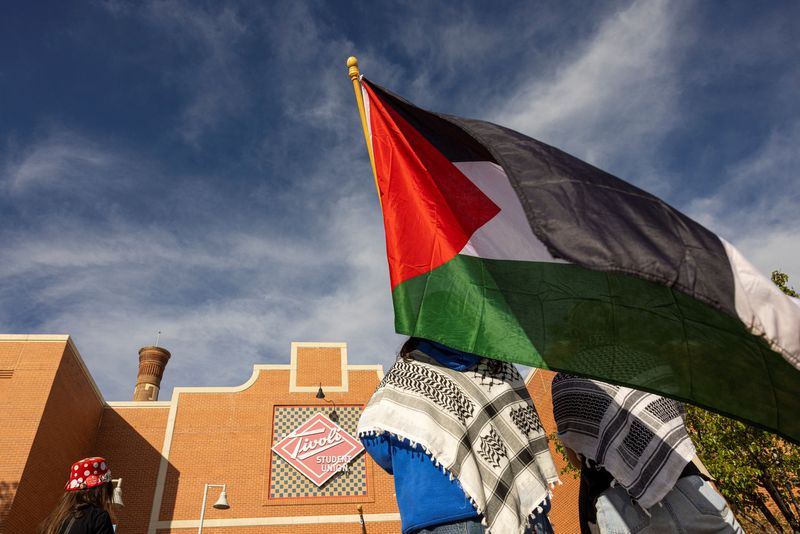By Jason Lange and James Oliphant
WASHINGTON (Reuters) - Democrats are deeply divided over President Joe Biden's handling of both the war in Gaza and the U.S. campus protests against it, a new Reuters/Ipsos poll found, fraying the coalition that he relied on four years ago to defeat Republican Donald Trump.
Some 44% of Democratic registered voters responding to the May 7-14 poll said they disapprove of Biden's handling of the crisis. Democrats who disapproved of his response were less likely to say they would vote for Biden in the Nov. 5 election -- no small concern given his tight rematch with Trump.
Biden has faced heavy criticism from some members of his own party for continuing to provide arms to Israel even though more than 35,000 Palestinians have been killed in the country's offensive in Gaza. The offensive began following the Oct. 7 attack where Hamas militants killed 1,200 people and abducted 252 others, according to Israeli tallies.
The flow of weapons has continued even after Biden last week delayed a shipment of 2,000-pound (907-kg) bombs and 1,700 500-pound bombs to Israel over concerns they might be used for a major invasion of Rafah, a town in southern Gaza.
The widespread campus protests, including some that have ended in violence when university officials called in police to clear campus, have undermined Biden's 2020 campaign pledge of a return to stability after Trump's chaotic four years in office.
Trump, meanwhile, has been working to exploit the unrest over the issue, urging Jewish voters, young voters and others unhappy with Biden's performance in the White House to cross over to him.
Overall, just 34% of registered voters approve of Biden's handling of the war, including 53% of Democrats, 31% of independents and 22% of Republicans.
Demonstrations against the war have not been limited to college campuses, with protesters targeting Biden and other members of his administration at public events for months.
The poll, conducted online, surveyed 3,934 U.S. adults nationwide, including 3,208 registered voters. It had margins of error of about 2 percentage points for responses from all registered voters, about 3 points for registered Republicans and Democrats and about 4 points for independents.
"This issue is a stone-cold loser for Biden," said Douglas Schoen, a pollster and strategist who reviewed the Reuters/Ipsos poll results. "He's losing votes from the left, right and center."
RFK FACTOR
Among the registered Democrats who disapprove of Biden's response to the Gaza conflict, about 77% said they would vote for him in November, compared to about 93% of those who approved of his Gaza response.
While those voters might not turn to Trump, they could choose not to vote at all or cast a ballot for Robert F. Kennedy Jr., whose independent campaign garnered the support of about 13% of registered voters in the poll.
Schoen said there was a strong likelihood that the Gaza issue could inflict serious damage on Biden in Michigan, a key battleground state with a large Arab-American population and where Kennedy is on the ballot.
Americans are also uncertain what U.S. policy toward Israel should look like. When asked which party has the better policy, 39% of Democrats and 43% of independents said they didn’t know.
Some 38% of registered Democrats say they support the pro-Palestinian protests at U.S. universities and cities over Gaza, compared to 38% who said they do not. Registered independents leaned against supporting the protests 58% to 23%, while Republicans overwhelmingly opposed the protests 81% to 8%.
Some 33% of Democrats agreed with a statement that the protests reflected an antisemitic view, while 37% disagreed. Some 45% of independents agreed with that statement and 30% disagreed. Some 67% of Republicans agreed and 14% disagreed.
Trump has courted Jewish voters for years through efforts such as relocating the U.S. embassy to Jerusalem. But he has also blasted Jewish Democrats by suggesting they are disloyal to Israel.
Sam Markstein, political director of the Republican Jewish Coalition, pointed to exit polls that show his party’s share of the Jewish vote has been rising since 2016 and contended it would grow further this year.
"This isn't a flash in the pan. It's a trend, long in the making," Markstein said.
Kenneth Wald, who studies the Jewish-American vote at the University of Florida, said he was skeptical the conflict or the protests would generate a large-scale shift away from Democrats.

Secular Jews in particular, Wald said, are likely to stay aligned with Democrats if the alternative is Trump.
With regard to young voters, Wald said, "when the choice is between Trump and Biden, they will vote for Biden even if they are unhappy with the things he’s doing."